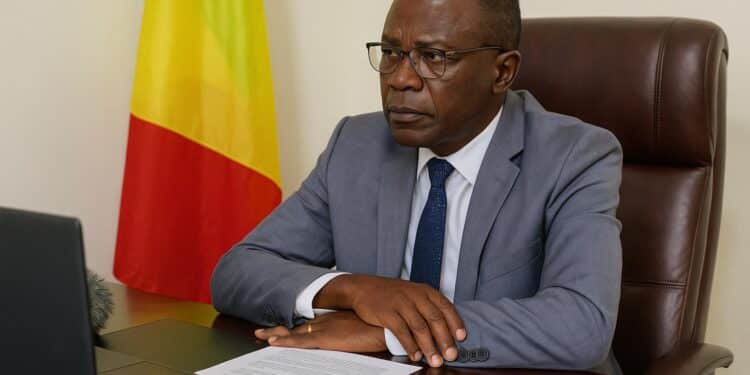Regional portfolio reshuffled
Meeting in Bangui on 10 September, the ministers of the Economic Union of Central Africa unanimously chose Congo-Brazzaville’s Ludovic Ngatsé as president of the UEAC Council of Ministers, handing him the political steering wheel for the bloc’s integration agenda for the next twelve months.
Created beside CEMAC’s monetary institutions, the council defines customs common policy, supervises structural reforms and endorses community-wide investment projects, making its chair a key influencer of fiscal harmonisation, trade facilitation and cross-border infrastructure that investors track closely.
“There will be a lot to do,” Ngatsé acknowledged after the vote, reminding peers that Brazzaville also leads the CEMAC Economic and Financial Reform Programme, Pref-CEMAC, a dual responsibility he described as “an opportunity to deepen convergence and unlock credible growth”.
Why Ngatsé’s mandate matters for investors
Pref-CEMAC’s new three-year matrix emphasises customs digitalisation, a region-wide risk-based tax scheme and renewed discipline on public procurement, measures designed to reduce transaction costs in Cameroon-Gabon-Congo corridors and to raise non-oil revenue without weakening the fragile post-pandemic recovery.
Business groups consulted in June praised the draft for including a one-stop investment portal and for promising to cap border waiting times at 48 hours, yet they cautioned that success will hinge on seamless data sharing between national customs and the regional telecom backbone.
Fiscal outlook remains cautiously positive
Ngatsé insisted that despite temporary treasury tensions, Central Africa’s macro fundamentals are “globally good”, citing growth projections of 2–3 percent for 2024, supported by incremental oil output in Congo and Equatorial Guinea and by recovering timber exports toward Asian markets.
The IMF’s latest Article IV reports echo that optimism, forecasting the CEMAC overall fiscal balance to improve from –0.6 percent of GDP in 2023 to a surplus next year, provided governments maintain the current fuel-price pass-through and rein in off-budget capital spending.
Deepening monetary cooperation
While the CFA franc remains anchored to the euro through BEAC, ministers signalled fresh interest in upgrading payments infrastructure and exploring a regional central bank digital currency, an initiative expected to reduce settlement delays that currently average five days for intra-zone transfers.
Governance also tops the agenda; the new council pledged to publish quarterly scorecards comparing each member’s implementation of convergence criteria, a measure international creditors have long requested to improve transparency and unlock cheaper financing for green power and transport projects.
Congo-Brazzaville’s enhanced diplomatic capital
The same Bangui summit nominated President Denis Sassou Nguesso to chair the wider CEMAC Conference of Heads of State, giving Brazzaville simultaneous control of the political and technical arms of regional integration – an unprecedented alignment of influence since the bloc’s creation in 1994.
Diplomats in Libreville interpret the rotation as recognition of Congo’s recent fiscal reforms, including its early adoption of the new petroleum code and the successful restructuring of Chinese project debt, moves that freed budgetary space for health and climate-resilience programmes.
Implementation challenges ahead
Freight forwarders note that Douala-Ndjamena trucking times still exceed ten days because of multiple checkpoints; unless Cameroon and Chad harmonise controls, UEAC tariff reforms alone will not deliver the envisioned 30 percent reduction in logistics costs spelled out by the Pref-CEMAC dashboard.
Another hurdle lies in institutional capacity: only three of six member states have yet aligned their procurement codes with the community directive, and the regional court of justice is still awaiting permanent judges, limiting its power to arbitrate commercial disputes swiftly.
What businesses should monitor next
The council is expected to publish an updated convergence timetable before December, detailing milestones for common corporate tax bands, e-customs pilots and a green-bond framework that could unlock concessional finance from the African Development Bank and European partners.
Private equity firms are also watching the planned rollout of a regional collateral registry, flagged by Ministers Christian Yoka and Ngatsé as a priority for 2024, because it would boost lending to small manufacturers that still struggle to pledge movable assets.
Risk factors remain, notably the volatility of Brent crude and the uncertain timetable for elections in Chad and Gabon, yet analysts at international banks argue that a coordinated reform anchor could cushion shocks and sustain the region’s gradual re-entry to capital markets.
Voices from the region
“The Bangui conference is a turning point for us,” Finance Minister Christian Yoka told reporters, stressing that Congo and its neighbours must translate communiqués into deliverables that citizens feel “at the petrol pump and at the border post, not only in spreadsheets”.
As the new leadership settles in, businesses, donors and the diaspora will scrutinise early wins such as the mutual recognition of truckers’ licences and the start of the Brazzaville-Bangui fibre link, benchmarks likely to signal whether momentum is indeed shifting.
Regional economists point out that UEAC membership represents a combined market of 58 million consumers with median age under 20; if supply chains integrate, household demand for cement, mobile data and processed foods could spur a second wave of industrial diversification.












































